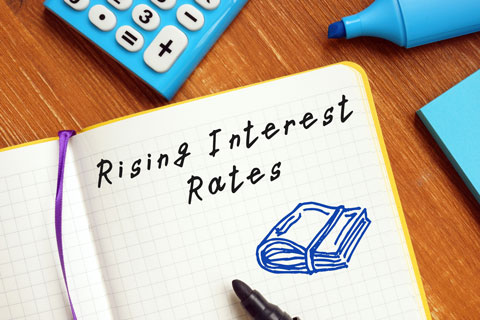Rising Interest Rates
Beat Inflation Series
August 25, 2022
Q: I keep hearing about the Fed continuing to raise the interest rates this year. How will this impact the economy and the current inflation rates?
A: The rising inflation rate, once determined to be a transitory and natural consequence of pandemic lockdowns, now appears to be have increased 8.5% over the last 12 months according to the consumer price index (CPI). To help control prices, the Federal Reserve has increased interest rates.
Let’s take a deeper look at what the current economic circumstances mean for the average consumer as
well as steps you can take to protect your investments and manage your money in the most optimal
manner.
What is the Fed and what purpose does it serve?
The Federal Reserve, also known as the Fed, is the central bank of the United States. Its purpose is to keep the U.S. economy operating at optimal efficiency.
The Fed focuses on employment and inflation as well as other economic indicators. To prevent the Fed from gaining too much power, it has a system of checks in place, including the following:
- A Board of Governors that is independent of the federal government
- Twelve semi-independent Federal Reserve Banks, each of which represent a particular geographic area of the U.S. and are the operating arms of the Fed
- The Federal Open Market Committee (FOMC), consisting of 12 people
To help the country maintain maximum employment levels and stability in prices, the FOMC votes on
whether their current target range for the monetary policy rate is appropriate for the contemporary
economic climate. This target rate, also known as the Federal Funds rate, is the rate at which financial
institutions, like banks and credit unions, lend money to each other. As a general rule, if inflation is
rising, the Fed may choose to raise its interest rates to contain it. On the flip side, if the economy
is heading toward a recession, the Fed may choose to lower the interest rate to help promote lending and
economic activity. Keep in mind that these are generalities and that the Fed and your financial
institution can choose to react to the market in a way that best suits them.
What happens
when the Fed raises interest rates?
When the Fed increases interest rates, as it has throughout 2022, financial institutions typically
raise their rates as well. Consequently, the cost of borrowing money becomes higher. Conversely, it
encourages more people to save as the savings rates offered by banks and credit unions will typically
increase, too. These factors mean less money is circulating in the economy, which will hopefully reduce
the level of inflation.
How do I manage my finances in a rising rates
environment?
The average consumer has been hit hard by the increased prices of everything from gas to groceries over the past year. There’s good news ahead for the struggling consumer, as the anticipated increases in interest rates are expected to help tame inflation. However, there are other steps you may want to take to protect your investments and manage your money as rates increase:
- Stay calm. Alarming headlines get the most clicks, but stock market news nearly always sounds more distressing than it is. It’s a good idea to do your research and check multiple news sources before making major financial decisions. It’s rarely a good idea to liquidate a stock based on headlines alone as long-term growth can sometimes make temporary losses obsolete.
- Plan ahead. As always, it’s best to have savings set aside for any economic
circumstance. If you don’t already have one, build an emergency fund of at least 3-6 months’ worth of
living expenses to prepare for any economic reality. As a bonus, beefing up your savings when interest
rates are rising means giving your money a better chance at growth.
- When in doubt, seek professional advice. If market news takes an especially disturbing turn, you may want to seek the counsel of a financial advisor for the best steps to take with your investments. Rebalancing your portfolio with a new asset allocation can help your investments maintain peak performance levels even during a rising rates environment.
While we do not have a crystal ball to let us know what inflation or the fed will do going forward,
the tips outlined in the this blog can give you some ideas you may want to implement with your finances.
Looking for more help with your finances or investments? We’d be happy to help look at your current loan
situation at your local branch and see if we can help
save you monthly or for investment help our Investment Representative Chris Birkenbeul is available by appointment.